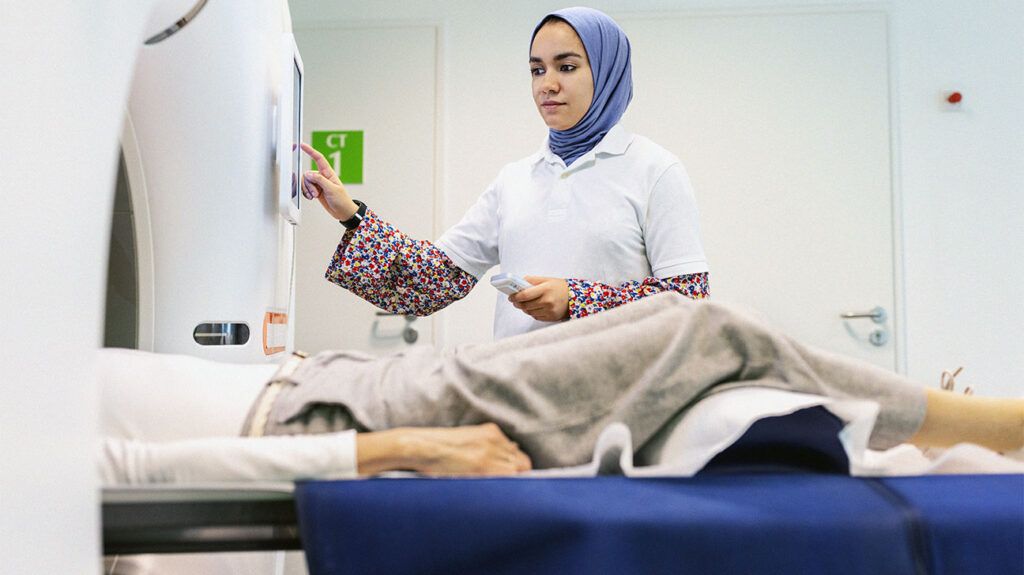Amyotrophic lateral sclerosis (ALS) is a condition that causes the degeneration of the nerve cells in the nervous system, affecting certain neurons in the spinal cord.
ALS is a fatal disease that causes a progressive loss of voluntary muscle control, making it progressively more difficult to perform basic movements such as walking, speaking, and swallowing. The condition is also known as Lou Gehrig’s disease. Health experts do not know the exact causes of this disease, as most cases are sporadic, and there are few inherited cases.
When ALS occurs, the disease starts attacking specific cells of the nervous system, damaging them and eventually causing cell death. This specifically affects the nerves in the spinal cord’s lateral (side) portions that control voluntary movement of the body. Eventually, people with ALS lose control of the muscles necessary for eating and breathing.
This article will review how ALS affects the spinal cord. It will also explore its symptoms, treatment, and outlook.

ALS causes the death of a specific type of nerve cell in the spinal cord. When the nerve cells die, this causes
ALS can eventually affect the lateral motor nerves at all levels across the spinal cord.
What is ALS?
ALS is a progressive neurodegenerative illness that affects the cells in the neurological system. Amyotrophic comes from the Greek language and means “no muscle nourishment.” ALS causes muscle loss due to lack of use.
ALS develops in the lateral areas of the spinal cord, affecting nerves that control voluntary muscles.
The initial symptoms of ALS can vary from person to person, depending on which spinal cord levels are affected. In its early stages, the disease typically causes muscle weakness and worsens over time as more nerve cells die.
ALS symptoms
- difficulties walking or performing everyday activities
- falling or tripping frequently
- weakness in the ankles, feet, or legs
- slurred speech
- difficulties swallowing
- hand weakness
- weakness alongside muscle twitching or cramps in the shoulders, arms, or tongue
In the later stages, people may have problems chewing and breathing. However, ALS does not usually cause pain or affect bladder control or the senses.
If a person notices any symptoms of ALS,
The causes of ALS
Researchers think ALS may develop due to a combination of environmental and health factors, such as:
- nerve inflammation
- protein misfolding or other degenerative conditions
- free radical damage
- glutamate imbalances
Anyone can develop ALS. However, people who are non-Hispanic white biological males aged above 60
A note about sex and gender
Sex and gender exist on spectrums. This article will use the terms “male,” “female,” or both to refer to sex assigned at birth. Click here to learn more.
ALS can be difficult to diagnose in its early stages as it can display symptoms similar to other illnesses. Doctors may perform a combination of tests to help diagnose it and rule out other conditions,
- nerve and muscle biopsy
- blood and urine tests
- an MRI scan
- a nerve conduction study
- a lumbar puncture, also known as a spinal tap
- electromyogram
These tests can help look for signs of ALS or other diseases by detecting nerve structure changes and spinal cord tumors. They also help determine the ability of the nerves to send and receive electrical impulses.
- physical therapy and exercise
- heat treatment
- stem cell therapy
- massages and meditation to help relaxation
Doctors may include some medications in the ALS treatment plan to slow the progressive death of nerve cells, decrease the levels of glutamate in the body, and reduce the progression of motor loss. These medications may include:
- riluzole (Rilutek, Tiglutik, Exservan)
- sodium phenylbutyrate/taurursodiol (Relyvrio)
- edaravone (Radicava)
- tofersen (Qalsody)
As ALS progresses, doctors may recommend assistive devices, such as wheelchairs, braces, and special mattresses, to support the body and improve comfort. In the more advanced stages of ALS, people may need nutritional support, feeding tubes, and communication boards when speaking becomes challenging.
Doctors may refer someone with ALS to a group of health specialists. These healthcare professionals can provide appropriate treatment and recommendations for every specific symptom that may develop during the progression of the illness.
There is no cure for ALS, which is eventually
Currently,
Amyotrophic lateral sclerosis (ALS) is a progressive neurodegenerative condition that causes the death of nerve cells in a specific region of the spinal cord and brainstem. People with ALS lose control of their muscles over time, affecting their ability to perform basic actions such as walking, speaking, or eating.
There is no cure for ALS, and it is eventually fatal. However, many treatments can help slow the progression of the illness, provide comfort, and improve the life quality of those with the condition.
